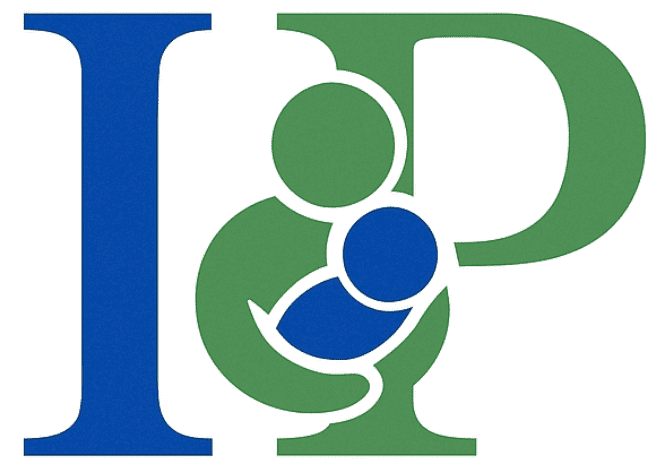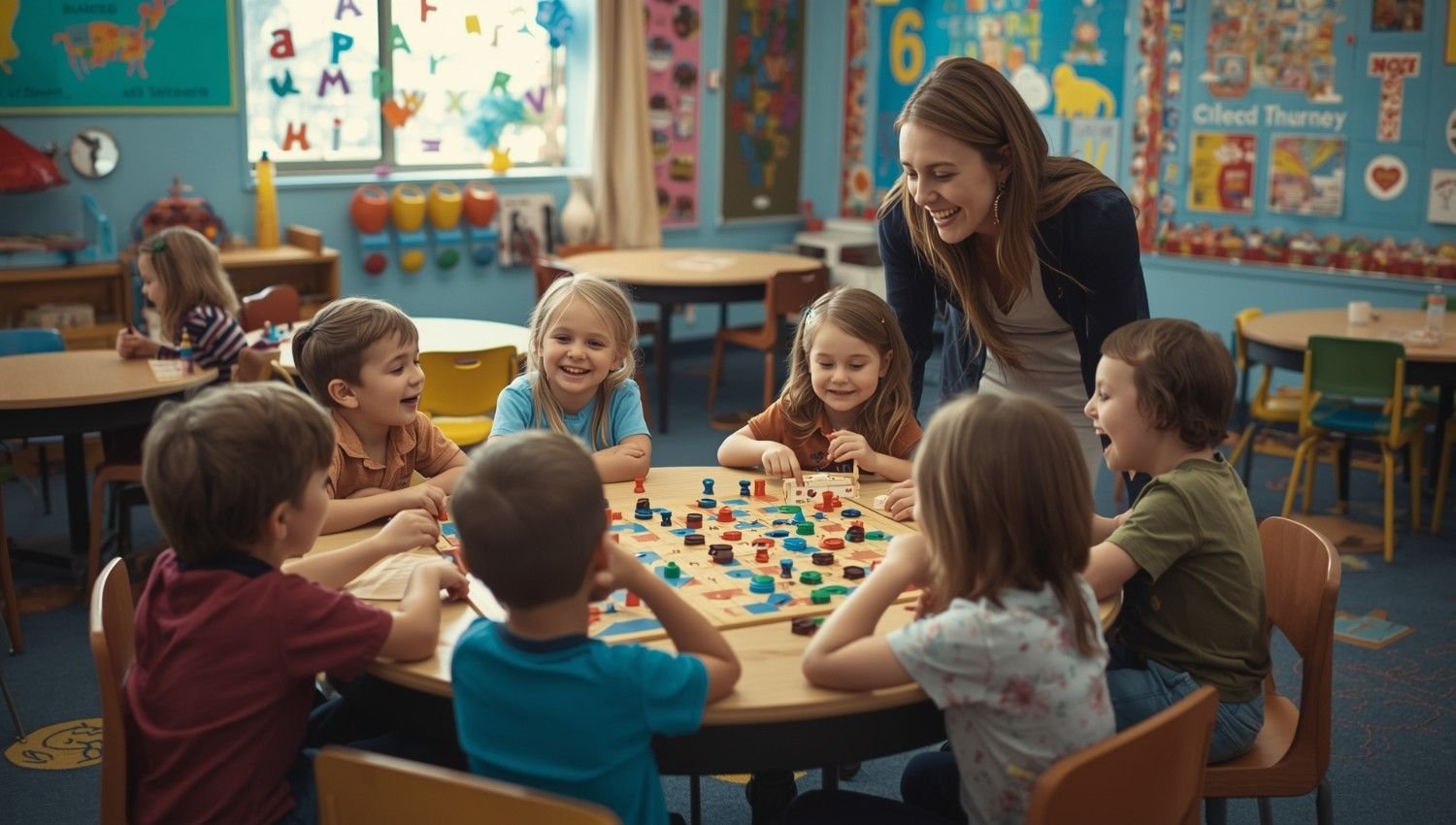Introduction:
When it comes to nurturing a well-rounded child, social skills games for kids at home and in kindergarten play a crucial role. These games provide fun and engaging ways for young ones to interact with their peers, parents, and teachers while learning vital life skills. At home or in kindergarten, activities like Simon Says, conversation Jenga, and roleplaying help kids develop an understanding of communication, turn-taking, and empathy. Through these evidence-based activities, children learn how to express themselves, manage emotions, and respond to others in a variety of social situations.
What Are Social Skills?
Social skills are the foundation for how children communicate, interact, and build relationships with others. From a young age, kids start learning the basics like active listening, empathy, and conflict management, which help them navigate social situations more confidently. Whether it’s problem-solving with friends, sharing toys, or taking turns, these skills are essential for fostering healthy and successful relationships. The development of these core skills, like the 5C’s—creativity, critical thinking, curiosity, collaboration, and communication—not only contributes to social-emotional well-being, but also boosts the child’s ability to thrive in both school and life. By nurturing these skills, we help children develop into confident, empathetic individuals who can understand and respond to others in a caring, cooperative way.
What Are Social Skills Activities?
Social skills activities are fun and engaging ways to help children improve their ability to communicate, interact, and actively listen in social settings. These activities, like playing Simon Says, engaging in roleplaying, or practicing sharing and taking turns, offer opportunities to boost social competence. Regular participation in these games helps children recognize and express their emotions, fostering confidence in how they interact with others. Through these activities, children also learn to problem-solve and take care of themselves and others, all of which are vital for building long-lasting, healthy relationships. By encouraging such activities, we provide kids with a toolkit to grow into confident and empathetic individuals ready to face a variety of social situations.
Building Confidence Through Social Skills Games
As toddlers and preschoolers engage in social skills games, they not only learn the importance of building relationships but also gain confidence in navigating interpersonal relationships. For example, playing conversation Jenga or story chains encourages kids to practice listening, making friends, and understanding how their actions affect those around them. These games teach valuable conflict resolution skills, helping children understand how to respond to others respectfully and handle tricky situations in the future. Games that promote cooperation, such as community gardening, allow children to experience the rewards of working together and being kinder to their peers. All these activities enhance a child’s ability to get along with others, whether it’s at home, in kindergarten, or in future interactions, building the confidence needed for healthy relationships.
Social Skills Games for Kids in Kindergarten: Boost Children’s Confidence
Scavenger Hunts
Specifications: Set up a scavenger hunt in the living room or garden, giving children clues or riddles to find specific objects. Use a time limit to create a sense of urgency.
Objectives: This game improves organizational skills and enhances problem-solving abilities. Children will practice cooperation and teamwork, working together towards a common goal and learning to celebrate a reward once they succeed.
Roll the Ball
Specifications: In this simple activity, sit with toddlers and roll the ball back and forth. Discuss favorite foods or cartoons while playing, making the game fun and interactive.
Objectives: Rolling the ball promotes turn-taking, fosters communication between kids, and encourages active listening. It builds social connections and helps toddlers practice interaction in a non-pressuring environment.
Staring Contest
Specifications: Challenge children to a staring contest where they must maintain eye contact. To make it more playful, place a sticker on the child’s forehead as a fun target.
Objectives: This game develops active listening, focus, and social interaction. It’s a great way to practice cooperative play and helps kids develop skills in communication and nonverbal cues.
Emotion Charades
Specifications: Write different emotions on strips of paper. Have your child act out the emotion while others guess what it is, using both facial cues and body language.
Objectives: This activity builds empathy and helps children manage emotions. It promotes understanding of nonverbal communication and encourages children to express their feelings in a supportive environment.
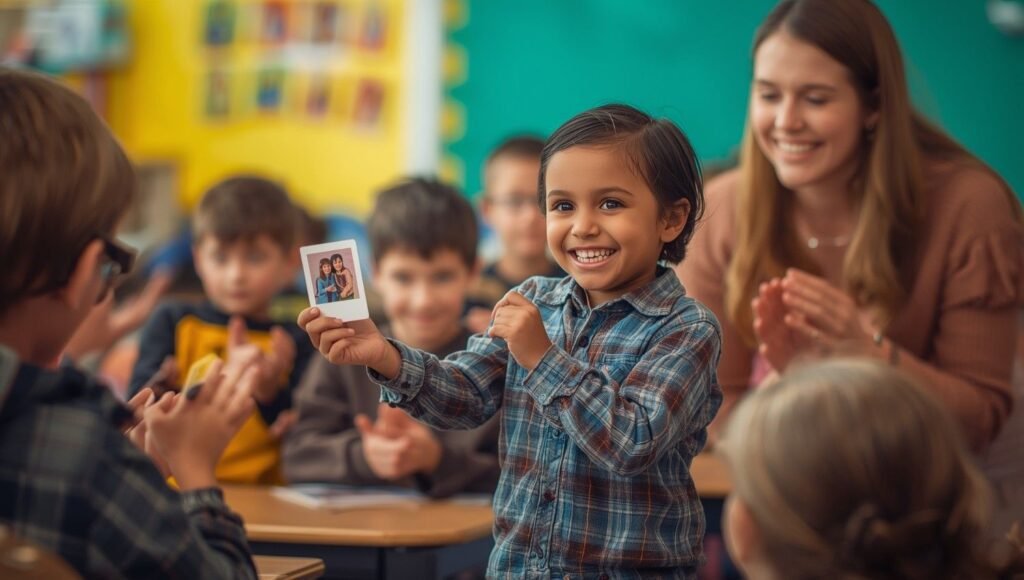
Expression Mimicking Games
Specifications: In this game, children mimic each other’s facial expressions and gestures. Encourage them to guess the emotion being expressed and switch turns.
Objectives: This helps children understand and recognize different expressions. It encourages them to feel more comfortable in social situations and prepares them for real conversations.
Topic Game
Specifications: Play a topic game where the child has to name as many animals, fruits, or other categories starting with a certain letter. Make it fun and engaging with rules to keep the activity structured.
Objectives: This game boosts creativity and encourages children to think on their feet. It promotes teamwork and helps kids practice communication skills in a fun and challenging way.
Step Into Conversation
Specifications: Use conversation cards to guide children into structured social skills practice. Topics can include empathy, good manners, or simple conversation starters like “What’s your favorite color?”
Objectives: The game teaches children to listen, respond, and maintain a fluid conversation. It supports self-control and helps them learn how to engage appropriately in various social situations.
Improvisational Stories
Specifications: Using cards with different pictures or words, children collaborate to create a story on the spot. Everyone adds to the narrative, with each child contributing new ideas.
Objectives: This encourages creativity, collaboration, and critical thinking. It helps children practice building interpersonal relationships while expanding their social skills in a group setting.
Name Game
Specifications: In the name game, children toss a ball to each other while saying their names. They can also add something fun about themselves, like a favorite activity or hobby.
Objectives: This activity helps children become more attentive to their peers and promotes a sense of belonging. It encourages active listening and can be a fun icebreaker to build social skills.
Rhythm Games
Specifications: In a rhythm game, children work together to make music or follow a pattern using claps, drums, or other instruments. Incorporate rules for cooperation and following directions.
Objectives: This game promotes joint music-making and teaches kids to cooperate with others while having fun. It also enhances their understanding of patterns and develops social behaviors in a collaborative setting.
Playing with Characters
Specifications: Use stuffed animals or dolls to create different scenarios. Encourage your child to interact with the characters, helping them communicate feelings and practice imaginary play.
Objectives: This encourages children to engage in role-playing, improving their ability to express emotions. It creates a safe, low-risk environment for developing social skills and empathy.
Play Pretend
Specifications: Set up a pretend play environment, such as a house, doctor’s office, or grocery store. Encourage your child to take on different roles and act out different scenarios.
Objectives: This game helps children adapt to different social situations and teaches them how to de-escalate emotions while practicing empathy and creative thinking in various roles.
Token Stack
Specifications: In the token stack game, children take turns stacking tokens while engaging in calm conversation. They must carefully listen and give thoughtful responses to each other.
Objectives: This helps children improve focus and practice turn-taking. It also builds their ability to maintain social skills like active listening and interaction in a controlled setting.
Decision-Making Games
Specifications: In this game, children must make decisions about a range of fun scenarios, like choosing between two animals or sorting objects. They will work with others to choose the best options.
Objectives: The game builds strategy and teaches children how to make decisions with low-risk consequences. It encourages cooperation and helps children learn how to deal with indecision.
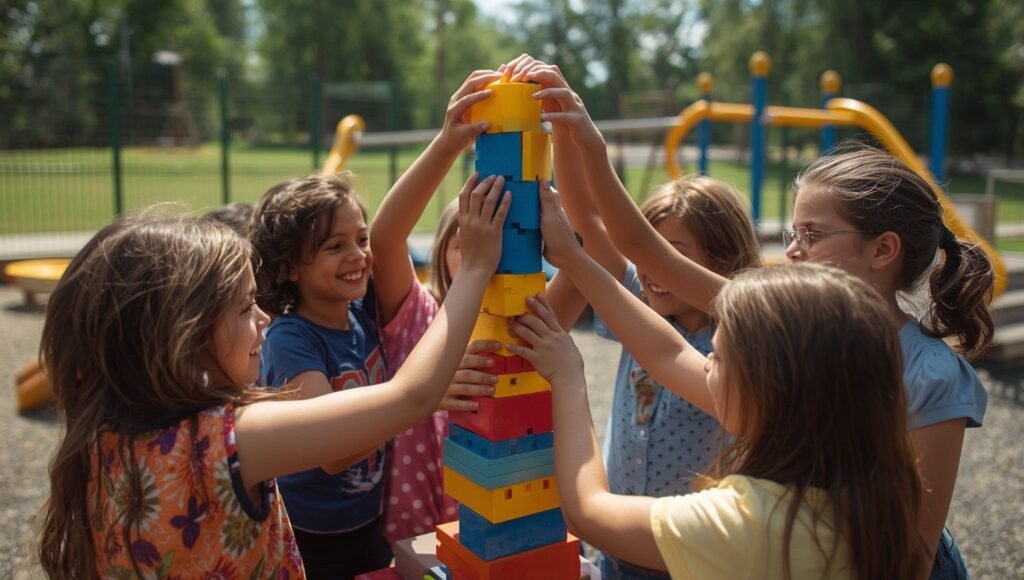
Building Game
Specifications: Set up a building game with blocks or other construction toys. Encourage children to work together to build a structure while communicating their ideas and taking turns.
Objectives: This game promotes teamwork, creativity, and problem-solving. Children practice critical thinking as they work towards a common goal and develop social relationships through collaboration.
Community Gardening
Specifications: Involve your child in community gardening activities. Help them plant flowers or vegetables while discussing the process and the importance of nurturing living things.
Objectives: Gardening encourages responsibility and teaches children about teamwork in an outdoor setting. It also promotes social competence and provides a calming space for children to connect with nature and others.
Team Sports
Specifications: Organize a team sports activity like soccer or basketball. Focus on teamwork, where children have to pass the ball and support each other in reaching a common goal.
Objectives: Team sports teach children how to deal with emotions such as winning and losing. It encourages teamwork and communication while helping kids understand how to collaborate towards a common goal.
Productive Debate
Specifications: Set up a productive debate on a fun topic, like “Should homework be banned?” or “What’s the best ice cream flavor?” Children should listen respectfully and take turns speaking.
Objectives: This game encourages listening skills and critical thinking. It helps children express their opinions in a calm manner while learning to deal with challenging situations and conflicting opinions.
Simon Says
Specifications: Play Simon Says, a classic game where children must follow instructions only if they begin with “Simon says.” It’s a fun way to practice attention and focus.
Objectives: This game helps kids practice self-control and impulse control. It builds listening skills and encourages children to stay focused while having fun.
Play Pretend
Specifications: Set up a pretend play scenario, such as a doctor’s office or store. Encourage your child to take on different roles and act out situations with their peers.
Objectives: Playing pretend helps children build empathy, understand different perspectives, and practice social skills in a low-risk and enjoyable environment.
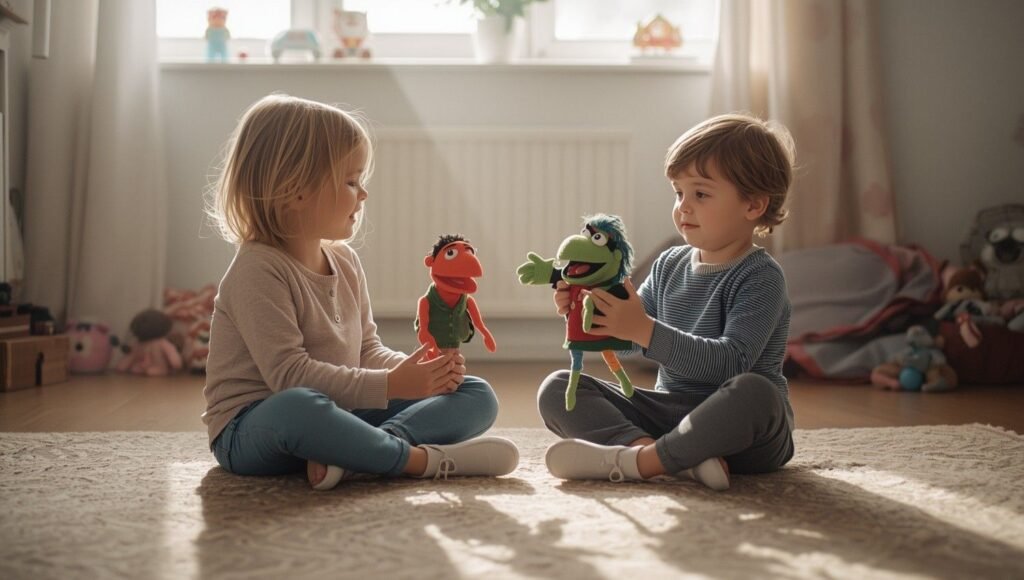
Board Games
Specifications: Play board games such as Snakes and Ladders, Outfoxed, or Mysterium Kids to help children engage in structured play. Set clear rules and encourage teamwork towards a common goal.
Objectives: These games improve critical thinking, promote strategy, and enhance communication. They also foster social skills such as turn-taking and collaboration, boosting children’s confidence as they work together to succeed.
Token Stack
Specifications: Create a token stack by stacking coins or chips while engaging in a conversation. Ask children to answer questions or share their thoughts as they stack each token.
Objectives: This activity helps children develop better focus and concentration. It also promotes conversation skills and turn-taking, providing a fun way to enhance social skills and interaction with others.
Community Gardening
Specifications: Engage children in community gardening where they nurture plants like sunflowers, marigolds, or zinnias. Help them maintain a garden journal to track their progress and take responsibility for their plants.
Objectives: Gardening teaches children about nature and the responsibility of caring for living things. It fosters teamwork, enhances social competence, and encourages children to engage with others in an outdoor, collaborative activity.
Virtual Playtime
Specifications: Set up a virtual playdate using online platforms like Discord or FaceTime. Encourage collaboration on projects like 3D design on TinkerCad or simple games on Scratch.
Objectives: Virtual playtime enhances children’s communication skills and boosts their creativity. It helps children adapt to new situations while practicing social skills in an online environment.
SOCIAL SKILLS ACTIVITIES FOR TODDLERS AT HOME
Look Into My Eyes
Specifications: Ask your toddler to make eye contact with you while you show them different faces, like a silly face or a smiling face. Encourage them to mimic your expressions, helping them focus on non-verbal cues.
Objectives: This game improves eye contact development and teaches toddlers about face recognition. It builds their ability to connect and bond with others, which helps develop positive social interaction and boosts their confidence.
How Do They Feel?
Specifications: Use a book or a TV show that highlights characters’ emotions. Afterward, have a discussion about how the characters felt and how they expressed their emotions.
Objectives: This activity expands the feelings vocabulary and improves emotional understanding. By identifying and discussing social cues, toddlers enhance their empathy and learn to express their emotions, contributing to emotional development.
Sensory Playtime
Specifications: Set up a sensory activity with materials like rice, beans, and kitchen tools for toddlers to explore. Let them share and take turns while using different tools and textures.
Objectives: Sensory play fosters the development of fine motor skills and sensory processing. This activity also enhances turn-taking, sharing, and provides opportunities for social interaction in a hands-on, engaging way.
Daily Dialogue
Specifications: Create daily dialogue with your toddler during routines, such as talking about their feelings or the events of the day. Encourage them to express emotions during these conversations.
Objectives: This helps develop social skills, enhances empathy, and increases emotional intelligence. The practice of daily conversations improves toddlers’ social awareness and strengthens their ability to connect emotionally with others.
Learn With Sesame Street
Specifications: Use Sesame Street episodes that teach about conflicts, kindness, and managing big feelings. Engage with your toddler by discussing the emotional growth the characters experience.
Objectives: This game supports emotional regulation, improves collaboration, and teaches conflict resolution. It builds foundational social skills and encourages empathy, helping toddlers manage their own emotions and interact kindly with others.
Deep Breaths
Specifications: Teach your toddler to take deep breaths when feeling overwhelmed or upset. Practice this together, showing how it can help them calm down.
Objectives: This activity promotes self-regulation and gives toddlers a coping mechanism for stress. It encourages mindfulness, helping them understand and manage their emotions in a healthy way.
Cooking Together
Specifications: Involve your toddler in meal prep by following simple cooking instructions together. Emphasize teamwork and communication as you work through the tasks.
Objectives: Cooking together helps toddlers practice cooperation and following directions. It provides opportunities to practice social interaction and builds a sense of accomplishment when working together towards a goal.
Dance Party
Specifications: Play some music and have a dance party where toddlers can express their emotions through movement. Encourage them to listen to the rhythm and share their feelings through dance.
Objectives: This game supports emotional expression and encourages physical activity. It also enhances listening skills and helps toddlers express themselves and communicate in a fun, active way.
Outdoor Exploration
Specifications: Take your toddler outdoors to explore nature. Encourage them to observe plants, animals, and their surroundings. Discuss what they see and hear to build their curiosity.
Objectives: This promotes nature appreciation and enhances environmental interaction. It also provides a calm and relaxing environment for toddlers to practice social interaction while exploring the outdoors.
Photo Talk
Specifications: Show your toddler pictures from a photo album and ask them to identify and express feelings in the photos. Encourage them to guess what others might be feeling.
Objectives: This activity develops social awareness and enhances emotional recognition. It strengthens non-verbal communication skills and helps toddlers understand how emotional cues are expressed visually.
Role Playing
Specifications: Use dress-up clothes and act out different scenarios, such as being a doctor, teacher, or superhero. Encourage toddlers to take on roles and explore different perspectives.
Objectives: Role playing enhances empathy, as toddlers practice understanding others’ emotions. It also boosts creativity and helps toddlers develop essential social skills through imaginative play.
Puppet Show
Specifications: Use puppets to act out different stories and have your toddler join in by using the puppets to express emotions. Encourage them to create their own characters and plotlines.
Objectives: This activity promotes emotional expression and creativity. It helps toddlers understand social interactions and develop empathy through storytelling and role play.
Camp Kindness
Specifications: Use the HOMER app or other resources to play a kindness game that focuses on emotions and being kind to others. Encourage your toddler to practice empathy and social-emotional growth.
Objectives: This game supports emotional intelligence and helps toddlers learn how to interact kindly with others. It encourages social skills and provides opportunities to practice empathy in real-life situations.
Simon Says
Specifications: Play Simon Says with your toddler by giving commands like “touch your toes” or “jump in place.” Emphasize attention and self-control to follow the instructions.
Objectives: This game helps toddlers build listening skills, impulse control, and concentration. It also fosters turn-taking and encourages patience, making it a fun and educational activity.
Board Games
Specifications: Play simple board games like Snakes and Ladders with your toddler. Focus on turn-taking, following rules, and engaging in teamwork during the game.
Objectives: Board games teach communication, encourage problem-solving, and enhance social skills. Toddlers also learn about cooperation and enjoy fun family games that promote teamwork.
Sharing Circle
Specifications: Gather a group of toddlers and sit in a circle to encourage sharing. Ask each child to express something positive or show appreciation to others.
Objectives: This activity fosters social-emotional growth, improves expression, and helps children understand the importance of gratitude. It enhances social awareness and improves their ability to share thoughts and feelings in a group.
Apology Practice
Specifications: Use real-life situations to practice apologizing. Teach toddlers to say, “I’m sorry,” and model empathy when they make mistakes or hurt someone’s feelings.
Objectives: Apology practice teaches emotional regulation, accountability, and responsibility. It also helps toddlers understand the importance of empathy and strengthens their social skills in building healthy relationships.
Tower Stack
Specifications: Use blocks to create a tower, encouraging your toddler to take turns stacking and guessing when the tower might fall. Focus on patience and turn-taking.
Objectives: This activity builds focus, self-control, and problem-solving skills. It also teaches toddlers the value of working together as a team and practicing cooperation while having fun.
Cards For A Nursing Home
Specifications: Have toddlers make cards using art supplies for a nursing home. Encourage them to draw, write, or decorate the cards with positive messages to brighten someone’s day.
Objectives: This activity promotes empathy, enhances social skills, and fosters community service. It also strengthens toddlers’ social awareness and encourages them to express kindness to others.
Emotional Charades
Specifications: Use emotional charades to act out different emotions like happy, sad, or angry. Ask toddlers to guess the emotion based on body language and facial expressions.
Objectives: This activity helps toddlers develop better emotional understanding and non-verbal cues. It fosters empathy and encourages toddlers to express their emotions more openly.
Tips for Teaching Social Skills
Teaching social skills to children can be a rewarding yet challenging task. It’s important to offer extra guidance and practice to help them build their confidence in various interactions. One effective way is by modeling good social skills yourself, as children tend to learn by example. For instance, during conversations, practice active listening by making eye contact, nodding, and asking questions. These small gestures teach them the appropriate behaviors for meaningful communication and relationships. Additionally, use role-play to create different scenarios, where your child can practice handling conflict or talking to a new classmate. This gives them a safe, controlled environment to learn how to navigate challenging social situations.
Another important tip is to reinforce behavior by offering specific praise when they demonstrate positive interactions. For example, when your child shares their toys or invites friends to play, make sure to acknowledge their actions and praise them for being considerate. This helps boost their confidence and encourages them to continue practicing these behaviors. Additionally, be mindful of any underlying issues, such as anxiety or ADHD, that might make social situations harder for them. In such cases, it’s always a good idea to consult a healthcare provider for guidance on supporting your child in their struggles. With patience and consistent practice, your child will become more confident in their social skills and be better prepared for playdates, activities, and future relationships.
